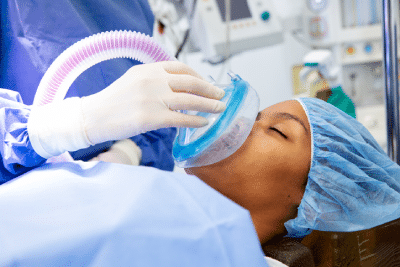An estimated 150 deaths are recorded each year in the United States due to anesthesia complications that occur during surgery and other medical care. Anesthesia errors also resulted in injuries including tracheal damage, brain damage, birth defects, spinal cord injury leading to paralysis, heart attacks and stroke.
Among the causes of medical malpractice due to anesthesia errors are harmful drug interactions, the use of too little or too much anesthesia, failure to recognize allergic reactions, defective medical devices, loss of airway, and inattention by medical staff.

If you or someone you love suffered a severe injury or death due to medical malpractice involving anesthesia, you should call one of our anesthesia injury attorneys for a free evaluation of your case.
Common Causes of Anesthesia Errors
Anesthesia errors can be catastrophic and often result from several common issues:
- Medication and Dosage Errors: Whether too much or too little, incorrect dosage can lead to severe complications or lack of sufficient pain relief. Also, administering the wrong medication through misidentification or syringe mislabeling can be catastrophic.
- Improper Equipment Use: Anesthesia equipment must be properly maintained and operated. Errors can occur if equipment is outdated or malfunctioning.
- Communication Failures: Effective communication among medical staff is crucial. Miscommunications about a patient’s condition or medication specifics can lead to errors.
- Inadequate Patient History Review: A thorough review of the patient's medical history is vital to identify any factors that might influence anesthesia effectiveness or safety.
- Lack of Vigilance: Keeping a close eye on the patient's condition is vital. If the patient's condition isn't monitored diligently, significant problems can occur.
The Role of Anesthesiologists in Preventing Medical Errors

Anesthesiologists play a critical role in the surgical team by ensuring the safety and comfort of patients through:
- Preoperative Evaluation: Assessing and understanding the patient's medical history to tailor anesthesia plans. Identifying potential risks specific to the patient, such as respiratory issues or reactions to certain types of anesthesia, which guides the selection of the safest anesthetic agents and techniques.
- Monitoring: Vigilantly observing the patient's vital signs and adjusting anesthesia as necessary during procedures.
- Postoperative Care: Managing recovery from anesthesia and addressing any immediate complications. Providing detailed instructions and precautions for the recovery period, including pain management and signs of potential complications that should prompt immediate medical attention.
Legal Steps to Take After Experiencing an Anesthesia Error
If you believe you've suffered from an anesthesia error, it's important to take the following steps:
- Medical Assessment: Obtain a comprehensive medical examination to determine the extent of any injuries or complications caused by the anesthesia error.
- Legal Consultation: Speak with one of our knowledgeable attorneys who specializes in medical malpractice to evaluate your case.
- Documentation: Compile all relevant medical records, bills, and any communications related to the procedure.
- Filing a Claim: Initiate legal proceedings within the appropriate time frame. The statute of limitations in medical malpractice cases in Pennsylvania is two years from the date of the error or from the date when the error was discovered.
Types of Compensation in Anesthesia Error Lawsuits
Victims of anesthesia errors may seek several types of compensation:
- Medical Expenses: Covering both current and future medical bills resulting from the error.
- Lost Wages and Earning Capacity: Compensation for time off work and any future earnings lost due to complications.
- Pain and Suffering: For physical pain and emotional distress endured.
- Punitive Damages: Awarded in cases of egregious negligence to punish the wrongdoer and deter similar behavior.
How Our Attorneys Can Help with an Anesthesia Error Case
An experienced medical malpractice lawyer can provide invaluable assistance by:
- Evaluating the Merits of Your Case: Determining if the anesthesia error constitutes malpractice.
- Gathering Evidence: Collecting and organizing medical records, expert testimony, and other crucial evidence.
- Negotiating Settlements: Skilled negotiation to reach a fair settlement before trial.
- Providing Court Representation: If a settlement is not possible, we are prepared to represent your interests during trial proceedings.
For anyone affected by an anesthesia error, understanding these aspects can help in deciding how to proceed legally and medically.
Kline & Specter, with five doctor-lawyers, has the experience to properly assess and litigate your claim. If you or a loved one has been impacted by an anesthesia error, our experienced medical malpractice attorneys can help you navigate the complexities of your case and seek the justice you deserve. Call 800-243-1100 for a free and confidential evaluation of your potential case. Kline & Specter handles cases in Pennsylvania, New Jersey, Delaware, and New York. For cases outside those states, the law firm works with local attorneys in each state as applicable.
Why Choose Us For Your Anesthesia Error Lawsuit?
Kline & Specter, PC, has more than 50 attorneys, five of whom are also doctors, with the experience to investigate and litigate potential cases of anesthesia errors. Among the firm’s attorneys is Gary Zakeosian, who is also a board-certified anesthesiologist who has represented a number of patients who suffered anesthesia injuries.
One well-known case was that of Adam Covenko, a 24-year-old Philadelphian and former wrestler who underwent a routine rhinoplasty two weeks before he was to be married. He wound up dead. The cause was improper removal of an airway tube resulting in Covenko losing his airway for several minutes. Zakeosian and Tom Kline obtained a substantial settlement in the case.
Another case involved a four-year-old girl who suffered brain damage while being tested for diabetes. Dr. Zakeosian discovered that she had been too heavily sedated during the procedures, causing respiratory depression, and that she had not been properly monitored. The firm won a multi-million dollar settlement.
Dr. Zakeosian helped determine in yet another case that an anesthesiologist was responsible for a woman suffering a stroke and resulting paralysis after her blood pressure was allowed to drop too low during surgery. Again, the case concluded with a substantial settlement.
How Common Is Anesthesia Malpractice?
Statistics compiled by the National Institutes of Health showed 2,211 recorded anesthesia-related deaths in the United States over a 10-year period, with 42.5 percent due to adverse effects of anesthetics in therapeutic use, 3.6% to complications of anesthesia during pregnancy, labor, and puerperium, and 7.3% to other complications of anesthesia. It noted that anesthesia-related deaths were more prevalent among male and elderly patients.
Contact Our Attorneys at Kline & Specter PC
If you or a loved one was harmed by an anesthesia error in Pennsylvania, New Jersey, Delaware or anywhere in the US, please call our anesthesia injury attorneys at 800-243-1100. We can help.

